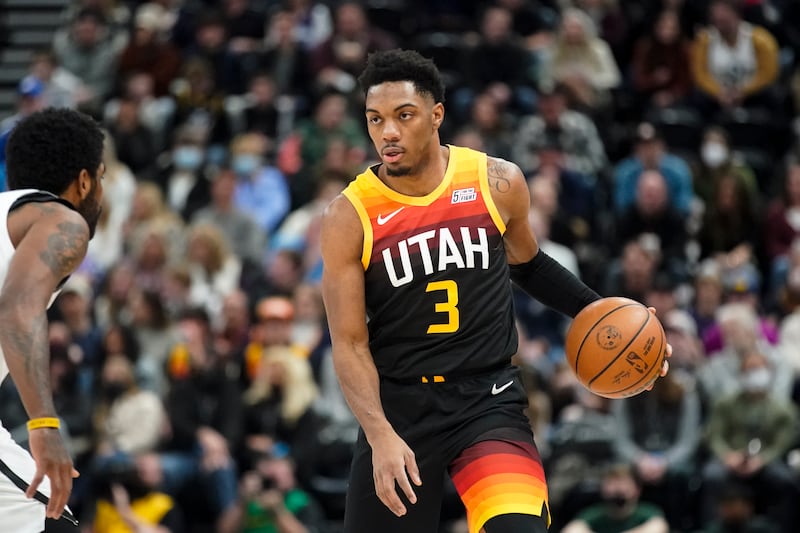As the NBA playoffs were approaching, the Utah Jazz — with an open roster spot — needed to make a decision.
The spot had been left open as an insurance policy and to allow flexibility should any intriguing prospects become available. That’s not unique to the Jazz, as it’s quite common for NBA teams to operate with that 15th roster spot available.
It had long been believed that the Jazz would convert Trent Forrest’s two-way contract to a standard NBA contract to fill in that last spot and make him eligible to play in the playoffs.
Forrest had spent the last two seasons improving and gaining the trust of everyone in the organization and, God forbid anything happen to Donovan Mitchell or Mike Conley in the postseason, Forrest would be able to seamlessly slip in to provide sturdy relief minutes.
According to team sources, while higher up and more influential roster moves would be decided on by the front office, with input from the coaching staff and other departments, when it came to the 15th roster spot — for a player who wouldn’t likely see the floor much in the postseason — the team would defer to head coach Quin Snyder and what his preference would be.
It was a pretty open secret that Snyder liked Forrest and trusted him quite a bit. The two-way guard became a regular part of the Jazz’s rotation, was getting playing time ahead of rookie Jared Butler and was the first option the Jazz coaching staff turned to when there was an injury in the backcourt lineup.
“One of the things that I’d heard about Quin is that he don’t usually trust a lot of his younger players,” Forrest said, “so it definitely meant a lot for me to know that he trusted in me to make plays and things like that.
“It was definitely kind of a big confidence boost for me.”
Though a wrist injury and a concussion kept Forrest sidelined for eight games late in the 2021-22 season, it still looked like he would be the best option for the final roster spot.
But, in his first game back from the concussion, just four days before the end of the regular season, Forrest suffered a badly sprained left foot.
The type of sprain the Forrest suffered (midfoot) would likely mean that he would be unable to play through the postseason, so if the Jazz were going to convert Forrest’s contract, it would largely be ceremonial.
There wouldn’t be any financial difference for the Jazz or Forrest at that point, and Forrest wouldn’t be playing, but the Jazz went forward anyway, converting Forrest to standard deal on the final day of the regular season.
Even though Forrest didn’t play in a game after his contract was converted, he said it was important to him.
“After the past two years, I feel like I’ve played really well,” he said. “Seeing other guys around the league that were in my same position, that were able to do the same thing and get short term deals with their team, it was definitely big for me.
“Felt like at some point, my hard work and everything that I was doing was gonna have to pay off.”
But now that the Jazz’s season has wrapped and Forrest is heading into restricted free agency, the Jazz can choose to extend Forrest a qualifying offer, match offers from other teams or let Forrest go elsewhere.
As of last week, Forrest was still in Utah, rehabbing from his foot injury with the Jazz staff and hoping to start some on-court work soon.
He was still experiencing some pain, so the rehab process has been slow and cautious, but there aren’t any long term concerns.
All that being said, the trust that the Jazz coaching staff has in Forrest could go a long way. The Jazz could likely retain Forrest for the amount of the qualifying offer, which would be just a hair over $2 million, but it will all depend on what happens with the rest of the roster.
If the Jazz keep Donovan Mitchell, make him the primary ball handler and look to trade Mike Conley, that could put Forrest in a position to be the backup point guard with a larger role and on a pretty team-friendly deal, but even if the Jazz have both Mitchell and Conley on the roster next season, Forrest could still maintain the role that he’s already had.
But the Jazz also have Butler and Nickeil-Alexander Walker on the payroll, which could impact Forrest’s future with the team.
If the Jazz are going to work on giving Butler a larger role, it could make Forrest a redundancy on the roster, so they might choose to let him take an offer from elsewhere.
No matter what, Forrest knows that the biggest thing he needs to work on in the offseason is his shot, which has been his one weakness.
Forrest has proven to be a tough defender with good instincts and has become more confident in creating his own shots around the rim, but through his two seasons with the Jazz, he took just 53 3-point attempts and hit at a 18.9% clip.
Forrest has been working with the Jazz coaching staff on improving his shooting and getting his form more consistent and expects that most of the offseason will consist of the same type of work.
“This summer is going to be a lot of the same thing,” he said. “I don’t need much pick-and-roll or things like that.
“A lot of (my work) is just gonna be a lot of left hand finishing and working on my shot.”


